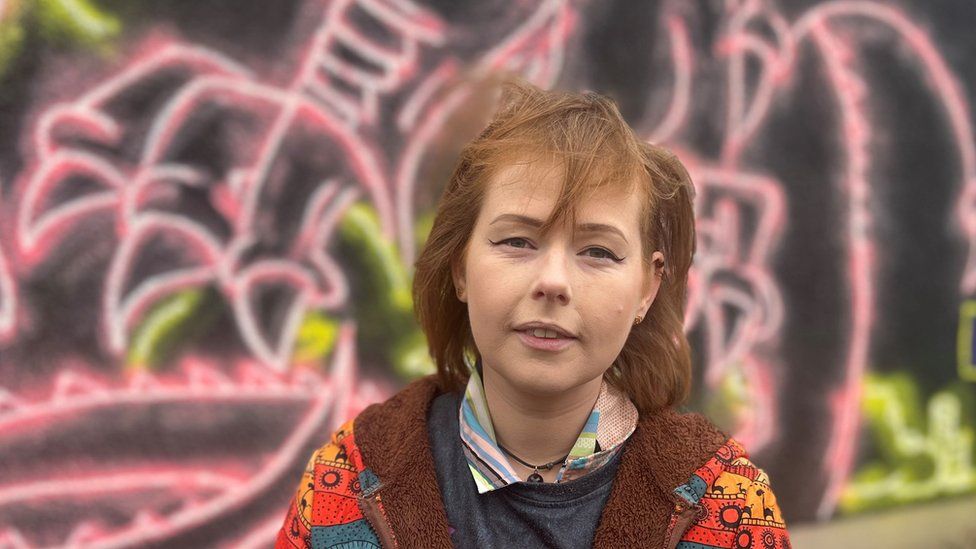
Tassia Haines has incurable breast cancer
By Catherine Evans
BBC News
A woman dying of cancer has called on other patients to continue her campaign for better treatment.
Tassia Haines was told two years ago that she had secondary breast cancer and is now receiving end of life care.
She is determined to “live every day as it comes” after raising awareness of red flag symptoms and the need for more nurses.
The Welsh government said it was working to improve the quality of cancer care.
Tassia’s petition calling for more support was debated in the Senedd last year.
Speaking to BBC Radio Wales Breakfast, the 31-year-old, from Port Talbot, described how she had developed a “superpower” despite her prognosis.
Tassia Haines wants everyone in her situation to be given help
“I really do live each day as it comes, which means I can’t really plan anything,” she said.
“But it does also empower me from having to worry about the future. But don’t get me wrong, that doesn’t mean I’m in denial. I’m very aware of my situation.
“I have accepted it. And I think accepting it is what’s helped me live.”
Tassia was diagnosed with primary breast cancer in 2016 when she was 24. She had chemotherapy, a mastectomy and radiotherapy.
In December 2019 she started having really bad back pain. She said she was assessed by a GP nine times in a month.
Image source, Tassia Haines
Tassia Haines says she is living each day as it comes, with husband Nick
At 28, she was diagnosed with secondary metastatic breast cancer in her bones, and told that it was incurable.
She said death was “always there”, but added: “It doesn’t pull me down.”
“I’m on end of life care. I accept death… but it’s actually the dying process that I’m afraid of.
“No matter how much you try to live your life in the moment, and I do manage that quite well, my body does like to remind me ‘hello, I’m still dying here’.
“I’ve got these images of being in a hospital bed, wasting away and my loved ones seeing me like that. That’s the bit I don’t like. I’d rather drop dead at a rave or something.
“I’m going to keep going out. I’m going to keep doing what I’m doing.”
Image source, Tassia Haines
Tassia has spent the past year campaigning for better treatment for breast cancer patients
After a year of campaigning, she said the progress she had made “meant the world to me”.
“It’s a tangible way to say what happened to me and other women that I know, that have driven me, this won’t happen again. Or at least it will really reduce the risk of it not happening again.
“In Wales, specifically, we now have the red flag symptoms in Welsh and English for secondary breast cancer. I really believe knowledge is power.”
She added: “As other people pick up and carry on, it won’t just be a little bit of a surge of all these great things that happen. We have two more secondary breast cancer nurses in line with NICE guidelines, which look after the whole needs of the patient and (are) real advocates.
“We now have Wales’ first metastatic breast cancer pathway, which is nearly signed off.”
Image source, Tassia Haines
Tassia said she gets comfort from time spent with her friends, family and pets
Tassia is proud of what she has achieved, but does not see the campaign as hers alone. She called on others to build on the “huge” progress made so far.
“It’s all about empowering the patient to know what could be available to them. It’s not about dying, it’s the needless suffering that it’s bringing that could be prevented.
“I think that’s what drives me to campaign and I think, because of these things that have come in, there will be some change. I work with a fantastic team. They assure me that it will continue after me.
“It’s not my campaign… it’s every patient in Wales with metastatic breast cancer.
“I want them to take it and say ‘this is my campaign’. That’s the only way it’ll survive and we will grow from that.”
‘Testament to her bravery’
In a statement last month, Health Minister Eluned Morgan said meeting Tassia had been “inspiring”.
“It is a testament to her bravery that she has been able to use her own extremely difficult circumstances to improve services for other people,” she said.
“It is important we continue to raise awareness of the symptoms of breast cancer. Tassia is also right to call for better data to be captured on metastatic breast cancer care.
“Our investment in a new NHS cancer information system means we will be able to capture this data in the future and together with the new national clinical audit for metastatic breast cancer this will support improvements in the quality of care.”








